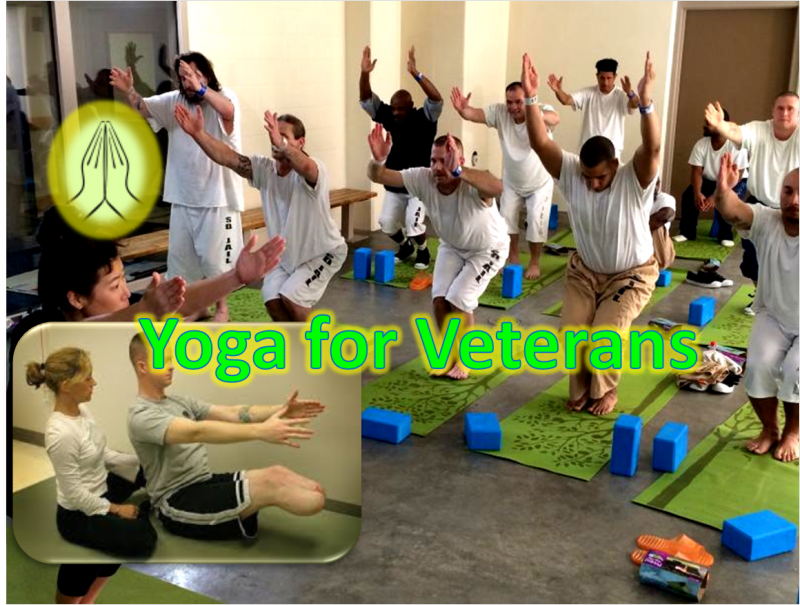
Yoga Benefits Veterans
Our veterans who served in the military for a long time go through so much stress by staying away from home, country, families, friends and they sacrifice all their life for the country and people. Once they return from their active duty, many veterans go through post traumatic stress disorder (PTSD). The implications of PTSD, often referred to as an invisible wound, manifest in homelessness, drug use, spousal abuse, and suicide. PTSD is a severe anxiety disorder that affects not only the veterans, also many others -that results from experiencing or witnessing life-threatening events ranging from combat to child abuse.
Life after active duty is leading warriors to their yoga mats in veterans’ centers of several countries. Many countries have been adopting Yoga to help these veterans. This is not very new. The concept of “healing mind” from yoga is helping people around the world to overcome their stress. Once the mind heals, the body naturally responds positively by regaining will power. Nearly a decade ago, the Department of Defense in US began to investigate the positive effects of yoga on veterans. In 2006, the department funded research that ultimately led to a yoga-based program called iRest.
A Green Beret and co-founder of the Veterans Alternative Center in Holiday, Florida Mr. Brian Anderson, feels that, “Too often, PTSD, as it relates to vets, has a stigma of ‘broken’ or ‘violent.’ ” Instead of using the term PTSD, Brian Anderson focuses on supporting veterans by addressing compounded nature of their experience and the challenges they face during their transition back to civilian life. In his center yoga is included as part of healing. The positive effect and positive energy that yoga brings to mind heals the body eventually. This is one of the reason, many veterans are willing to go on yoga mat. In fact, in many fitness centers one can see veterans attending yoga classes. Yoga provides access to and connection between the mind and body, it allows one to overwrite the fight-or-flight response (that dictates PTSD) over time, by integrating yoga postures, breath work, and meditation.
According to Agnieszka Golec de Zavala, senior lecturer in psychology at Goldsmiths, University of London, “Yoga helps people in moving away from negative thoughts” ; “The beneficial effects are due to the increased ability to focus on breathing that, firstly, focuses a person on a present moment and breaks rumination on negative traumatic thoughts, and secondly, increases ability of ‘intraception’ – observing and understanding internal states and the ability to control them, or understanding them as temporal and passing”.
How yoga helps veterans and soldiers?
It calms the nervous system: A guided breathing helps veterans to calm down the nervous system that used to over active due to stress and hormones. Pranayama breathing helps in focusing and bringing back mental balance. Yogic breathing, defined as a manipulation of breath movement, has been shown to positively affect immune function, autonomic nervous system imbalances, and psychological or stress-related disorders.
Sudarshana Kriya Yoga – that uses breathing as a main technique helps in nervous system imbalances and psychological or stress-related disorders.
Social re-integration: Practicing yoga with community helps with social re-integration and gives them a sense of normalcy.
Change in body habits: The environment and tough time that veterans would have faced in war zone results in certain body habits – stress in the body, anxiety and pain. Yoga helps them to let go of these habits.
Getting back to present: A common symptom of PTSD is a sense of disconnection of the mind and body, as well as feeling disassociated from surroundings and the present moment. Meditation followed by a mindful of yoga helps veterans to calm their mind and slowly brings them back to present.
Retreats and yoga classes for veterans and their families are springing up worldwide. Veterans who are attending yoga classes are showing positive response in mind and body with reduced stress, improved ability to connect emotionally with friends and family members, less sleeplessness, and an overall feeling of well-being.
References:
- http://www.lexingtonhealingarts.com/
- http://www.ptsd.va.gov/
- http://www.cnn.com/2015/11/11/health/
- http://www.veteransyogaproject.org/
Author: HealthyLife | Posted on: January 27, 2017
« Lotus Peacock Pose – Padma Mayurasana Learning survival strategy from winter »






















Write a comment